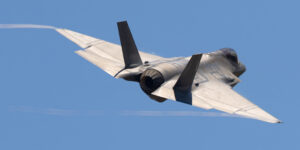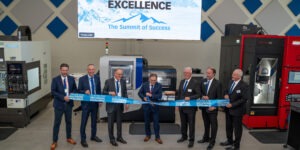Working without Forklifts
Forklift-free systems compliment lean manufacturing by replenishing material as it is used, rather than keeping excess material on the shop floor. And they can require less than half of the equipment and labor necessary to move those materials. Is it time to consider a switch?
Posted: February 20, 2013
Is your shop still using lift trucks to load jobs for your machine tool stations? One continuing goal in the push toward leaner operations is to achieve a forklift-free materials handling on the shop floor, or at least as much that is practically possible.
In a lean shop, delivering full loads or pallets out to the production floor with forklifts does not always function as effectively at stations or cells designed to work with smaller lots of material. Forklift-free systems compliment lean manufacturing by replenishing material as it is used, rather than keeping excess material on the shop floor.
Forklift-free systems open a brave new world of ways to tug loads in and around the plant on carts and dollies, loading and unloading work stations and refilling storage queues as needed, all without forklifts. Carts and dollies can be used as visual triggers to deliver smaller loads of parts up to the floor only when they are needed for replenishment.
Using carts and dollies helps to remove the excess inventory that is stacked in the aisles by converting as much of it as possible into mobile queues that can be fluidly transferred throughout the plant as frequently as needed by point-of-use demand. Since most job shops and contract manufacturers now compete for smaller product quantities, using carts and dollies to convert the inventories they carry into smaller mobile queues can help them cut overhead costs and reduce their investment in work-in-process materials.
A tugger with an industrial cart moves dunnage along side of a forklift performing the same task. Which is faster, the forklift or the industrial cart and tugger? To find out more, click here.
Obviously, forklift-free systems are not ideal for all operations inside a metal fabrication plant. But numerous suppliers manufacture all sorts of material transport vehicles and line-side accessories that can replace forklifts in those shops that want to investigate ways they can move closer to forklift-free systems. Some examples include:
TUGGERS
In forklift-free systems the tugs are small so that operators can sit in unobstructed positions without any restriction to their vision. They tow the carts behind them and only move forward. This is different from as lift trucks that may have limited visibility and are often used to back up.
The TR 4500 tugger from Crown (New Bremen, OH) allows operators to tow a rolling load capacity of 10,000 lb with an AC drive unit built to endure constant jerks, jolts and demands of high through-put manufacturing. The largest drive motor in the industry provides high torque and greater draw bar pull. Its e-GEN® braking system uses the powerful torque of the AC motor to deliver frictionless braking for long life and trouble-free operation.
The TR 4500 frame combines heavy-gauge steel with structural enhancements at the greatest points of stress. The TR 4500 uses 13 in drive tires with an innovative electronic power steering system for precise and effortless control flexibility for body positioning. The shock-absorbing floorboard and urethane cushion enhance postural relief and operator comfort.
CTX 3-wheel tow tractors from Clark Material Handling (Lexington, KY) are built with an all-steel frame and use a 48-volt AC drive system with regenerative braking on solid pneumatic tires and large brake drums to pull loads up to 15,400 lb. They provide operators with optimal ergonomics, smooth control and easy entry/exit, a fully adjustable full suspension seat and automotive-style pedal, column, and dash instrumentation.
TTW electric walkie tow tractors from Sroka (Cleveland, OH) can be scaled to maneuver loads up to 300,000 lb across any shop application and custom designed to mate with a specific hitch type.
ROLLER AND DECK CARTS
TrakSteerTM 4-wheel steer industrial LoBoyTM roller deck carts from Kinetic Technologies (K-Tec, Wickliffe, OH) are ideal for towing up to 2,000 lb loads. Their 4-wheel steering improves the tracking of the carts in long trains and is helpful for cornering or maneuvering in tight aisles. The heavy-duty roller deck is 7.5 in off the floor, with a maximum capacity for 48 in x 48 in containers (larger containers can fit outside of frame dimensions). Standard features include a heavy-duty floor lock, manual adjustable load stops, auto-hitch and spring-loaded self-stowing tow bar.
K-Tec also manufactures ProFlow TrakSteer 4-wheel steer industrial quality carts with low deck heights that can tow up to 2,000 lb loads. These carts have a one-piece formed flat steel deck with welded stiffeners for an 11 in deck height with quiet operation. The KT2-37NRTS cart handles small containers up to 36 in x 46 in, while the KT2-49NRTS cart carries large containers up to 48 in x 55 in. Standard features include a heavy-duty floor lock, choice of two popular deck sizes, an auto-hitch and a spring-loaded, self-stowing tow bar.
Martins Industries (Farnham, Quebec, Canada) builds flat tugger-towed deck platform trucks that replace forklifts by easily and very precisely move up to 4,000 lb loads by hand. Their truck platform can carry raw material and finish goods of very different shapes and sizes and can be used both inside and outside of the plant to freely and quickly change parts, loads and production methods.
TILT CARTS
Tilt Carts from Topper Industrial (Sturtevant, WI) were first introduced in 2000 and now use a patent-pending hydraulic speed dampening cylinder that manually adjusts to slow the tilt of a fully loaded unit that may weigh up to 2500 lb. This allows the operator to push the cart into the desired position and tilt a load of parts into an easily accessible picking position that requires minimal reach and lifting.
Besides the safe tilt control, the unit uses a spring-loaded lock-pin to lock the base in the tilted and upright position. The lock-pin actuates with minimal effort by a hand lever built into a 1¼ in steel push handle. The standard structure of all models of Tilt Carts consist of rigid structural steel tubing, ¼ in steel corner guides, six Toppster™ caster wheels configuration and floor lock.
Tilt carts can tilt in increments of 15 deg, 30 deg, 45 deg, 60 deg, 75 deg or 85 deg with a hydraulic or pneumatic lift-assist that returns partially emptied loads back to their upright position. The carts have a rhino-lined deck for noise reduction and skid resistance and have a baked-on powder coat for a durable long lasting finish.
Cart options include a pintle ring and auto coupler tow package or a Topper easy release hitch and coupler tow package, an auto floor brake that requires no floor lock and can only be disengaged by depressing and holding the handle lever that automatically engages when released, and lift guides that are used with pneumatic or hydraulic lifts.
MOVING TOWARD FORKLIFT FREE
A forklift-free system typically requires less than half of the equipment and labor because one tugger can tow from four to eight loaded carts with only one operator while a traditional system needs four employees to operate four forklifts. However, the choice to go forklift-free is not easy and requires much preparation.
Before switching from forklifts, the workflow throughout the shop must be evaluated to examine how each department and its suppliers will be impacted and what, if any, size or weight limitations may be involved. If carts and dollies limit certain material from converting to mobile queues then a forklift will work better.
The lean goal is to move toward a forklift-free operation wherever it is practical. But whenever it does not make sense, do not give up the forklift in favor of carts. Yet.
Crown Equipment Corporation, 44 South Washington Street, New Bremen, OH 45869, 419-629-2311, Fax: 419-629-2900, www.crown.com.
Clark Material Handling Company, 700 Enterprise Drive, Lexington, KY 40510, 859-422-6400, Fax: 859-422-7408, www.clarkmhc.com.
Sroka Inc., 21265 Westwood Drive, Cleveland, OH 44149, 440-572-2811, Fax: 440-572-1137, www.srokausa.com.
Kinetic Technologies, Inc. (K-Tec), 1350 Rockefeller Road, Wickliffe, OH 44092, 440-943-4111, www.ktecinc.com.
Topper Industrial, 1729 NE Frontage Road, Sturtevant, WI 53177, 262-886-6931, Fax: 262-886-9569, www.topperindustrial.com.
Martins Industries Inc., 1200 Industrial Boulevard, Farnham, Quebec, Canada, 450-293-9000, www.martinsindustries.com.














